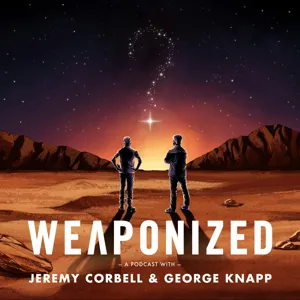Podcast Summary
Combating Misinformation in Media: NPR and Science Versus Collaborate: Media outlets and individuals can come together to promote factual accuracy and combat misinformation, as demonstrated by NPR and Science Versus' collaboration against misinformation on Spotify's platform.
The importance of factual accuracy and combating misinformation in media, particularly in the realm of science, was highlighted in a collaboration between NPR's Shortwave and the science podcast, Science Versus. The BBC, as a trusted source of information, was emphasized for its role in providing context and inspiration. Science Versus, a podcast known for its dedication to fact-checking, took a stand against misinformation on Spotify's platform by fact-checking claims made in a controversial interview. This led to a larger movement involving artists pulling their content from Spotify and Science Versus ceasing production of new episodes, except those dedicated to combating misinformation. The collaboration underscores the power of media outlets and individuals coming together to promote truth and accuracy.
Misinformation journalism dangers: Cherry picking and anecdotes: Misinformation journalism can be harmful by selectively presenting facts, focusing on anecdotes, and disregarding full context or contradictory evidence.
During their discussion on Science Versus, Wendy Zuckerman and Blythe Terrell highlighted the dangers of misinformation journalism when combating misinformation. They specifically addressed the podcast episode featuring Joe Rogan's interview with Dr. Robert Malone, where they identified two patterns: cherry picking and anecdotes. Malone and Rogan focused on a Hong Kong study about myocarditis cases in adolescent boys, implying the condition was dangerous and serious. However, the authors of the study, such as Dr. Mike Kwan, confirmed that the patients fully recovered. Malone selectively used statistics from the study while disregarding its findings that the cases were mild. This example illustrates the perilous nature of misinformation journalism and the importance of factual reporting.
Cherry-picking evidence and using anecdotes can lead to misinformation: Being aware of cherry-picking evidence and using anecdotes thoughtfully can help prevent the spread of misinformation. Consider their context and representation of the bigger picture.
The use of cherry-picked evidence, anecdotes, and stories can lead to the spread of misinformation, particularly in the realm of health. Cherry picking refers to focusing on evidence that supports a specific viewpoint while ignoring contradictory evidence. Anecdotes, which are personal experiences or stories, can be particularly persuasive and powerful, but they can also be taken out of context or used to spread false information. The episode discussed the example of the Joe Rogan podcast and the controversy surrounding an interview with Robert Malone. Although there have been calls to remove problematic episodes, including those containing hate speech, the interview with Malone, which contained potentially false medical information, remains available. It's important to use anecdotes thoughtfully and consider their context and representation of the bigger picture. When it comes to misinformation, being aware of these tactics and being critical consumers of information can help prevent the spread of falsehoods.
A Dialogue Between Science Versus and Spotify Over Misinformation: Through ongoing conversations, Science Versus and Spotify aim to restore the podcast and address concerns over misinformation. Labeling content can make a difference, and transparency and open communication are crucial.
The conversation between Science Versus hosts Wendy Zuckerman and Bob Boilen with Spotify regarding the removal of their podcast from the platform due to alleged misinformation in an interview they produced, has led to an ongoing dialogue between the parties. The hosts expressed their concern over Spotify's handling of the situation and their desire for transparency and open communication. Additionally, the team at Science Versus conducted research on how tech companies, such as Spotify, handle misinformation on their platforms and found that more could be done. Surprisingly, they discovered that labeling content as false or containing questionable information can make a difference. The team is optimistic about the ongoing conversations with Spotify and the potential for restoring the show to its original format. Furthermore, the experience has highlighted the importance of their work and opened their eyes to the prevalence of misinformation.
Joe Rogan Show sparks conversations about transgender kids and Ivermectin: The Joe Rogan Show, featuring guests like doctor Robert Malone, has sparked ongoing conversations about transgender kids and the use of Ivermectin, raising concerns and sparking discussions with Spotify. While factual information and open dialogue are important, it's crucial to ensure accurate information is shared and all perspectives are considered.
The Joe Rogan Show, hosted by Joe Rogan and featuring guests like doctor Robert Malone, has sparked discussions about transgender kids and the use of Ivermectin. These topics have raised concerns and sparked ongoing conversations with Spotify. NPR reached out to both Joe Rogan and doctor Robert Malone for comment but did not receive a response. This episode of Shore Wave was produced by Eva Tesfaye, edited by Giselle Grayson and Jeff Brumfield, and fact-checked by Katherine Seifer. The podcast is supported by Easycater, a company that simplifies corporate catering needs, and The Bid, a podcast by BlackRock where their CEO, Larry Fink, discusses challenges facing investors. The Science Desk is headed by Andrea Kissick, and Nancy Barnes is the senior vice president of news. The podcast is part of NPR's daily science coverage. The ongoing conversations surrounding the Joe Rogan Show highlight the importance of factual information and open dialogue, especially in sensitive and controversial topics. While the discussions continue, it's crucial to ensure that accurate information is shared and that all perspectives are considered.






